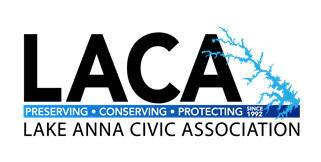- Home
- Partnerships
Partnerships & EDUCATIONAL RESOURCES |
Cyanobacteria Monitoring Program with Virginia Polytechnic Institute and State University: The partnership between Virginia Tech and LACA began in 2019 when Dr. David Schmale and members of his team came to Lake Anna to conduct aerial water sampling specifically focused on the potential Harmful Algae Bloom (HAB) issue on the lake. Dr. Schmale leads Virginia Tech's Schmale Lab, part of the School of Plant and Environmental Sciences. Dr. Schmale has developed technologies with unmanned aerial vehicles (UAVs or drones) to study microorganisms hundreds of meters above the surface of the earth. They are also using robots to track the movement of hazardous agents in the water. Virginia Tech will be analyzing water samples collected at Lake Anna (both from boats and their drones) to further this research. LACA benefits from this research as we further develop the baseline of data and information about harmful algal issues on the lake. You can contact the Water Quality Committee points of contact for more information on this academic partnership. We will also keep our membership informed on this partnership through this website and regular updates in the LACA Newsletter. Randolph Macon College Department of Environmental Studies Program Sediment Collection and Analysis Project: The partnership between Randolph Macon College (RMC) Department of Environmental Studies and LACA began in 2020 as a research effort focused on soil and sediment analysis from various locations in the upper regions of the lake. An undergraduate research program was started to collect and analyze sediment and soil samples from the North Anna River upstream of the 208 bridge, Pamunkey Creek, Terry's Run, Foremost Run, Plentiful Creek and Ware's Creek. This research is being conducted in partnership with Virginia's Department of Environmental Quality (DEQ) and will extend at least over a one-year period of time. The data obtained from this research will fill a knowledge gap in our understanding of factors that could promote and lead to the rapid growth of harmful cyanobacteria in the lake. You can contact the Water Quality Committee points of contact for more information on this academic partnership. We will also keep our membership informed on this partnership through this website and regular updates in the LACA Newsletter. Water Quality Monitoring Program Partnership with the Virginia Department of Environmental Quality (DEQ): LACA's water quality monitoring relationship with the Virginia Department of Environmental Quality (DEQ) started in 2002 and remains to this day a significant partnership for our organization. LACA’s partnership with DEQ follows strict guidance and Quality Assurance (QA) measures to ensure we provide the Lake Anna watershed community, the Commonwealth of Virginia and the watershed’s three counties with a baseline of important information. LACA's Water Quality Monitoring Program follows DEQ guidance and QA procedures and is recognized as a Level 3 data provider meaning that our data can be used in water quality assessments in accordance with DEQ’s Water Quality Assessment Guidance Manual. DEQ recognizes the significant value of citizen water monitoring programs given the resource limited environment that they operate under. In November 2018, DEQ surveyed citizen volunteer groups to identify how much money and time is spent monitoring Virginia waterways. The survey considered costs that included monitoring budgets, paid staff and volunteer time, mileage driven to collect samples, and other monitoring expenses. The document released by DEQ is available in our Water Quality Committee library. Water Sample Analysis at the Virginia Division of Consolidated Laboratory Services (DCLS): LACA maintains a Memorandum of Agreement (MOA) with the Virginia Department of General Services, Division of Consolidated Laboratory Services (DCLS) to analyze the water samples we collect. The MOA establishes a professional services Agreement between DCLS and LACA to formalize the analysis protocols and the costs associated with the testing of water samples collected by LACA's citizen volunteers. A copy of the current MOA is available in our Water Quality Committee library. Images of DEQ Sediment Sampling |
